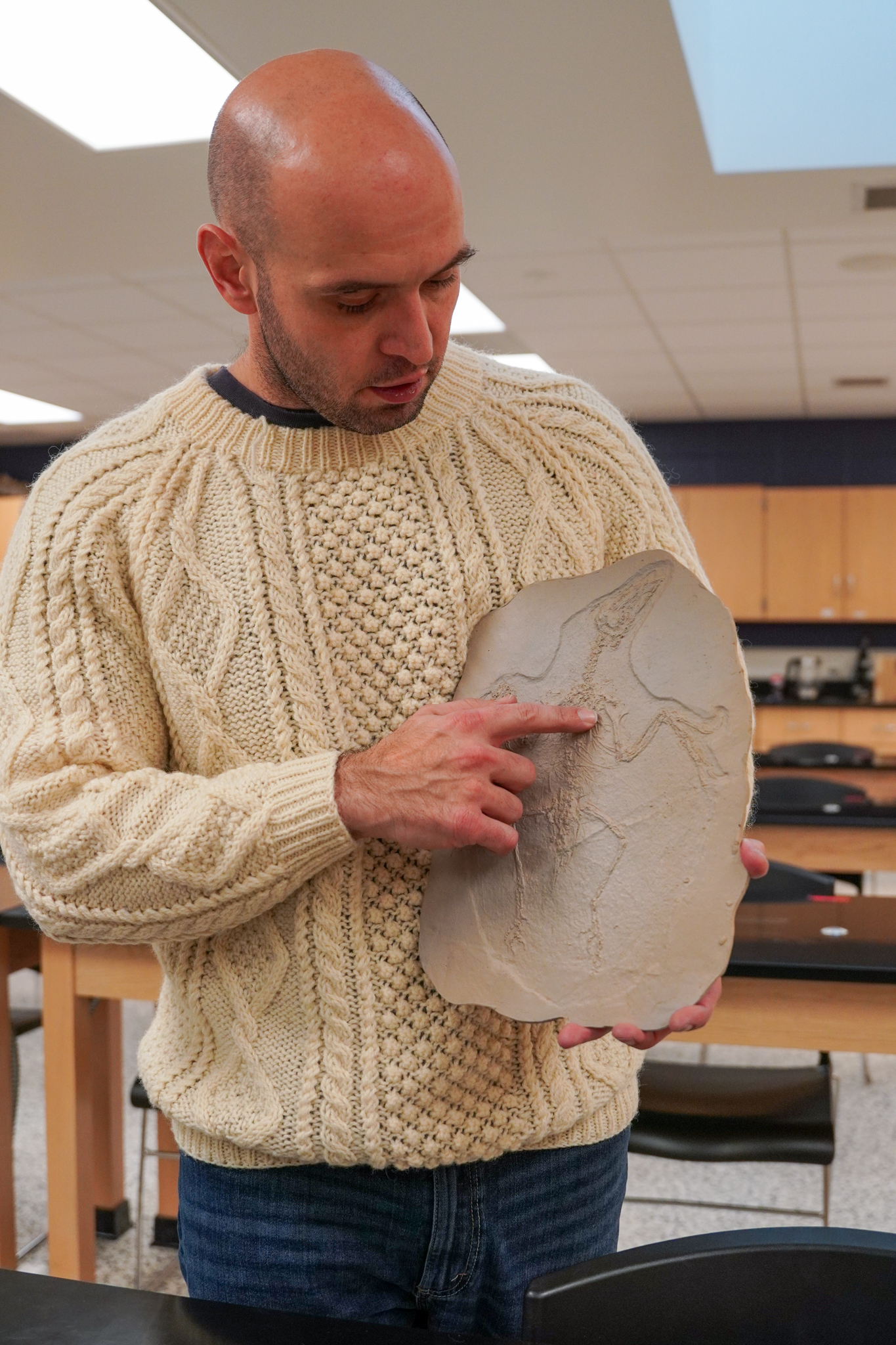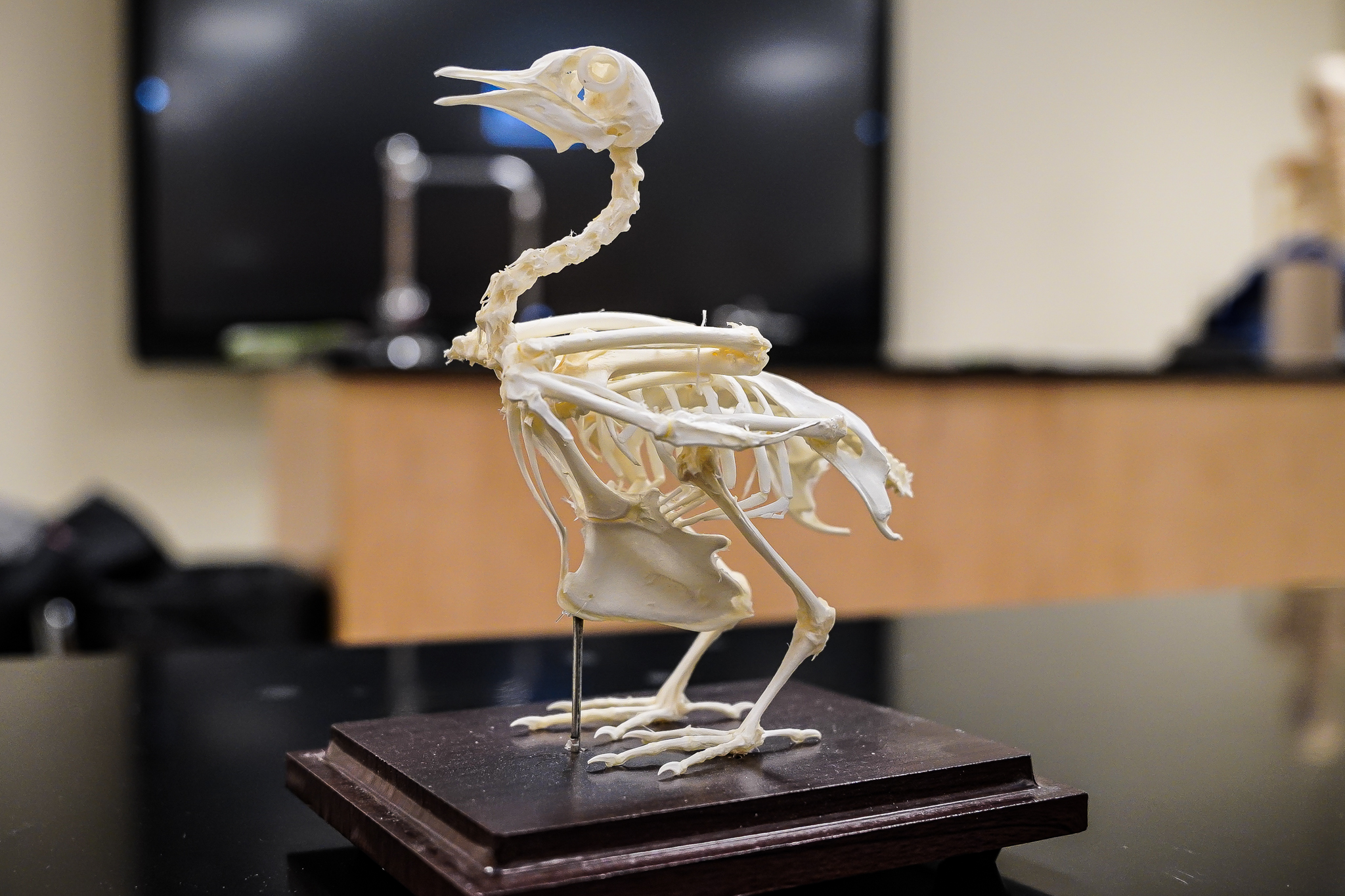Mount Marty Professor Among Scientists to Uncover First Record of Dinosaur Eating A Mammal and Sternum Loss in Prehistoric Birds
January 4, 2023
JANUARY 4, 2023, YANKTON, SD — Research involving Mount Marty biology professor, Dr. Alexander Dececchi and several worldwide colleagues, has uncovered the details of flight potential in prehistoric birds and the first record of a dinosaur eating a mammal—both of which were published in peer-reviewed journals late this fall.
Using laser-stimulated fluorescence to reveal unseen details of soft tissue in the fossils, Dececchi and his colleagues discovered that the muscle proportions, sizes, and attachments in early birds differed from today's modern birds.

"A lot of the shoulder mechanisms and the shoulder muscles are very different and they give a different flight stroke," Dececchi explained, adding that their findings also revealed some early birds lacked the large sternal bones and chest muscles we are familiar with in modern birds, like chickens.
"[Our research] shows this really key change in the pathway and evolution of the shoulder and arm muscles, which allowed flight to occur before birds had a modern setup with muscles on the chest."
While a natural curiosity for life and the past inspired Dececchi to pursue a career in biology, it was a former professor that inspired him to work on problems related to the origins of birds.
That professor was Hans Larsson of McGill University in Montreal, the scientist who discovered the remains of an ancient mammal between the ribs of a fossilized small-feathered dinosaur called Microraptor. This discovery kickstarted the second and most recently published peer-reviewed article involving Dececchi.
While previous studies have described other Microraptor specimens containing a bird, a lizard, and a fish, this new evidence for consumption of mammals establishes that this dinosaur had a diverse diet and was not a specialist on any given food source, the original press release stated.
 "We are familiar with how modern small and medium-sized hunters like foxes or cats take a variety of prey, but for some reason when we think of dinosaurs we seem to think everyone is a specialist," Dececchi explained. "One of the things we wanted to point out is that Microraptor would pretty much eat anything it could sink its teeth into."
"We are familiar with how modern small and medium-sized hunters like foxes or cats take a variety of prey, but for some reason when we think of dinosaurs we seem to think everyone is a specialist," Dececchi explained. "One of the things we wanted to point out is that Microraptor would pretty much eat anything it could sink its teeth into."
Research like this motivates Dececchi to continue reimagining the past and broaden the research on early flight and how it has evolved in birds and other organisms. He and several colleagues are currently working to create a research group and host a conference in Hong Kong this spring.
The full research article on flight potential and sternum loss in prehistoric birds was published by Proceedings of the National Academic of Sciences and can be read here. The full research article on the diet of the Microraptor was published by the Journal of Vertebrate Paleontology and can be read here.
###
About Dr. Alexander Dececchi
Dr. Alexander Dececchi is an assistant professor of biology at Mount Marty University in Yankton, South Dakota. The Canada native studied biology at Queen's University in Kingston, Ontario, and completed his Ph.D. in 2012 at McGill University in Montreal. He has traveled to China and Europe studying fossil specimens and conducted fieldwork in South America, Canada, Montana, and South Dakota.
Using laser-stimulated fluorescence to reveal unseen details of soft tissue in the fossils, Dececchi and his colleagues discovered that the muscle proportions, sizes, and attachments in early birds differed from today's modern birds.
"A lot of the shoulder mechanisms and the shoulder muscles are very different and they give a different flight stroke," Dececchi explained, adding that their findings also revealed some early birds lacked the large sternal bones and chest muscles we are familiar with in modern birds, like chickens.
"[Our research] shows this really key change in the pathway and evolution of the shoulder and arm muscles, which allowed flight to occur before birds had a modern setup with muscles on the chest."
While a natural curiosity for life and the past inspired Dececchi to pursue a career in biology, it was a former professor that inspired him to work on problems related to the origins of birds.
That professor was Hans Larsson of McGill University in Montreal, the scientist who discovered the remains of an ancient mammal between the ribs of a fossilized small-feathered dinosaur called Microraptor. This discovery kickstarted the second and most recently published peer-reviewed article involving Dececchi.
While previous studies have described other Microraptor specimens containing a bird, a lizard, and a fish, this new evidence for consumption of mammals establishes that this dinosaur had a diverse diet and was not a specialist on any given food source, the original press release stated.
Research like this motivates Dececchi to continue reimagining the past and broaden the research on early flight and how it has evolved in birds and other organisms. He and several colleagues are currently working to create a research group and host a conference in Hong Kong this spring.
The full research article on flight potential and sternum loss in prehistoric birds was published by Proceedings of the National Academic of Sciences and can be read here. The full research article on the diet of the Microraptor was published by the Journal of Vertebrate Paleontology and can be read here.
###
About Dr. Alexander Dececchi
Dr. Alexander Dececchi is an assistant professor of biology at Mount Marty University in Yankton, South Dakota. The Canada native studied biology at Queen's University in Kingston, Ontario, and completed his Ph.D. in 2012 at McGill University in Montreal. He has traveled to China and Europe studying fossil specimens and conducted fieldwork in South America, Canada, Montana, and South Dakota.
About Mount Marty University
Founded in 1936 by the Sisters of Sacred Heart Monastery, Mount Marty University is a Catholic, Benedictine institution of higher education located along the bluffs of the Missouri River in Yankton, South Dakota, with additional locations in Watertown and Sioux Falls. Mount Marty offers undergraduate and graduate degrees with particular focus on student and alumni success in high-demand fields such as health sciences, education, criminal justice, business, accounting, recreation management and more. A community of learners in the Benedictine tradition, Mount Marty emphasizes academic excellence and develops well-rounded students with intellectual competence, professional and personal skills and moral, spiritual and social values. To learn more, visit mountmarty.edu.
Founded in 1936 by the Sisters of Sacred Heart Monastery, Mount Marty University is a Catholic, Benedictine institution of higher education located along the bluffs of the Missouri River in Yankton, South Dakota, with additional locations in Watertown and Sioux Falls. Mount Marty offers undergraduate and graduate degrees with particular focus on student and alumni success in high-demand fields such as health sciences, education, criminal justice, business, accounting, recreation management and more. A community of learners in the Benedictine tradition, Mount Marty emphasizes academic excellence and develops well-rounded students with intellectual competence, professional and personal skills and moral, spiritual and social values. To learn more, visit mountmarty.edu.







